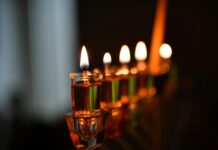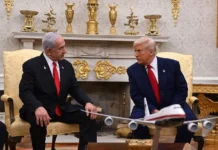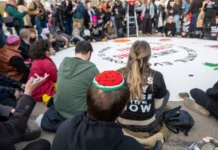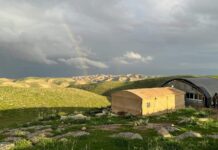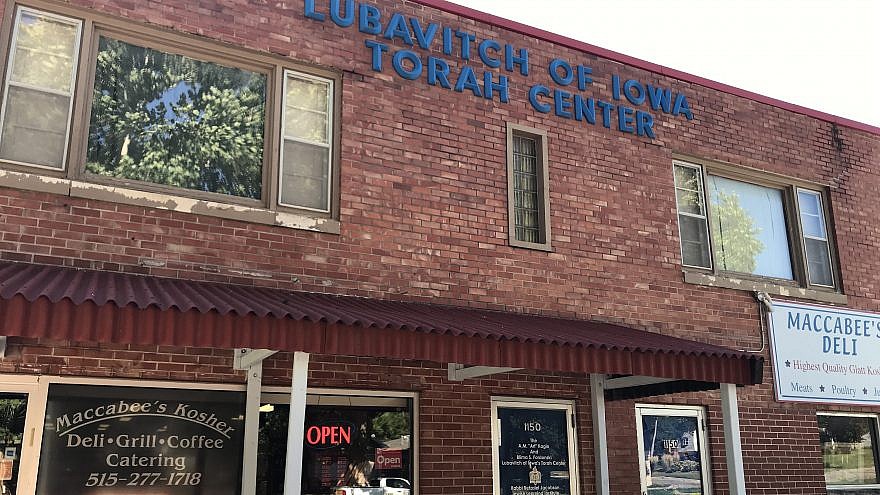DES MOINES, Iowa—With 165 days until the Iowa Caucus, the scene in the central Midwest has been busy in and outside the state’s annual fair with the candidates making their case over the past couple weeks at the fair’s “soapbox,” hosted by The Des Moines Register and elsewhere.
The Jewish community in Iowa—approximately 5,450, or less than 1 percent of the state’s population, with most of them in Des Moines—has been anything but absent from the action (there are even campaign kipahs at the state fair).
Most of Iowa’s Jewish community is “overwhelmingly” Democratic, observed Drake University political-science professor Dennis Goldford.
“Although small, we are a disproportionate share of the voter turnout; most of us participate in the political process, voting or volunteering for candidates or supporting them in other capacities. The community is strong,” said David Adelman, a Democratic political consultant for state and federal clients, a former president of the Jewish Federation of Greater Des Moines and currently the president of the Federation’s foundation, which supports Jewish causes in the community, including social and senior services, and the State of Israel.
Harlan “Bud” Hockenberg, a veteran Republican operative and leader in the Iowan Jewish community, said that he’s lived his whole life as “a minority within a minority.”
Regarding the Jewish community’s involvement in the Iowa Caucus, “I don’t think it’s unique to the Greater Des Moines or Greater Iowa community. I think Iowans generally take their role as first in the nation’s caucuses very seriously,” said Adelman, who is also chairman of the Iowa division of the American Israel Public Affairs Committee and serves on AIPAC’s national council. “I don’t think that’s any different with the Jewish community in Iowa.”
He remarked that Iowa’s residents have the opportunity to meet with the candidates and noted that, leading up to the Feb. 3 caucus, the Jewish community will be “taking a keen interest in the process—meeting with these candidates, asking them questions and even hosting them for roundtables, living-room townhalls or perhaps even for dinner, some of whom may even be [at] High Holiday services.”
Adelman added, “We have a great opportunity. I think sometimes Iowans are spoiled in the sense that we have almost day-to-day interactions with these candidates and definitely their staff.”
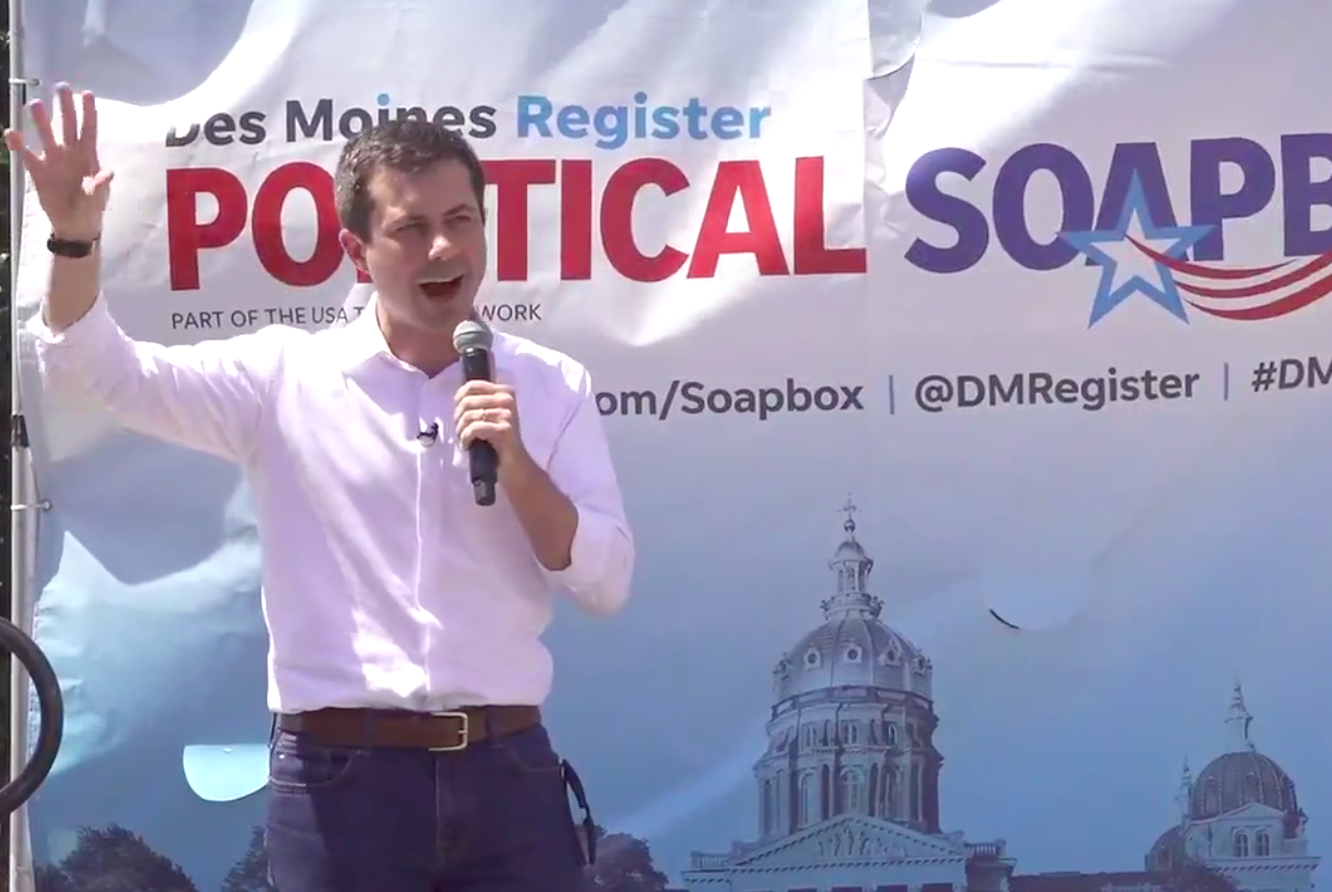
In past caucuses, the Iowa Jewish community has offered a venue to talk to the Jewish community. In 2015, former U.S. Secretary of State Hillary Clinton, Sen. Bernie Sanders (I-Vt.) (who is again running for the 2020 Democratic presidential nomination), former tech executive Carly Fiorina, former Sen. Rick Santorum (R-Pa.) and other candidates were at Jewish Federation forums.
The Jewish Federation of Greater Des Moines declined an interview request, but sent JNS a statement by its communications relations director Mark Finkelstein: “Like Jewish community members nationwide, Jewish community members in Des Moines tend to be vitally concerned with their political party at one level or another, and are typically not shy about expressing their opinions, certainly not to me as community relations director for the Federation.”
“If there’s anything the Federation stands for, however, is that we cannot let political divisiveness within the Jewish community stand in the way of the Federation attaining its mission—that of providing the social and educational services, the community-building services and programming which, in cooperation with our congregations enable our families to lead enriching Jewish lives here in Central Iowa,” added Finkelstein.
Iowans are known to take the caucus “very seriously,” from working or volunteering on campaigns to just bringing “in baked goods to feed the kids and help them” to providing lodging for campaign staff and volunteers, according to Will Rogers, a former secretary at the Jewish Federation and a former executive director of the Polk County Republican Party.
Truth be told, issues pertinent to the Democrats in Iowa’s Jewish community are no different than other groups: health care, the economy, abortion and immigration.
“If you get together with a bunch of Jewish citizens of Des Moines, talk will go to caucuses with the usual issues of whether, in fact, there’s a kind of liberal anti-Semitism or whether they find the president so appalling from their standpoint that they could never vote for him,” said Goldford. “Typical kinds of discussions and disagreements.”
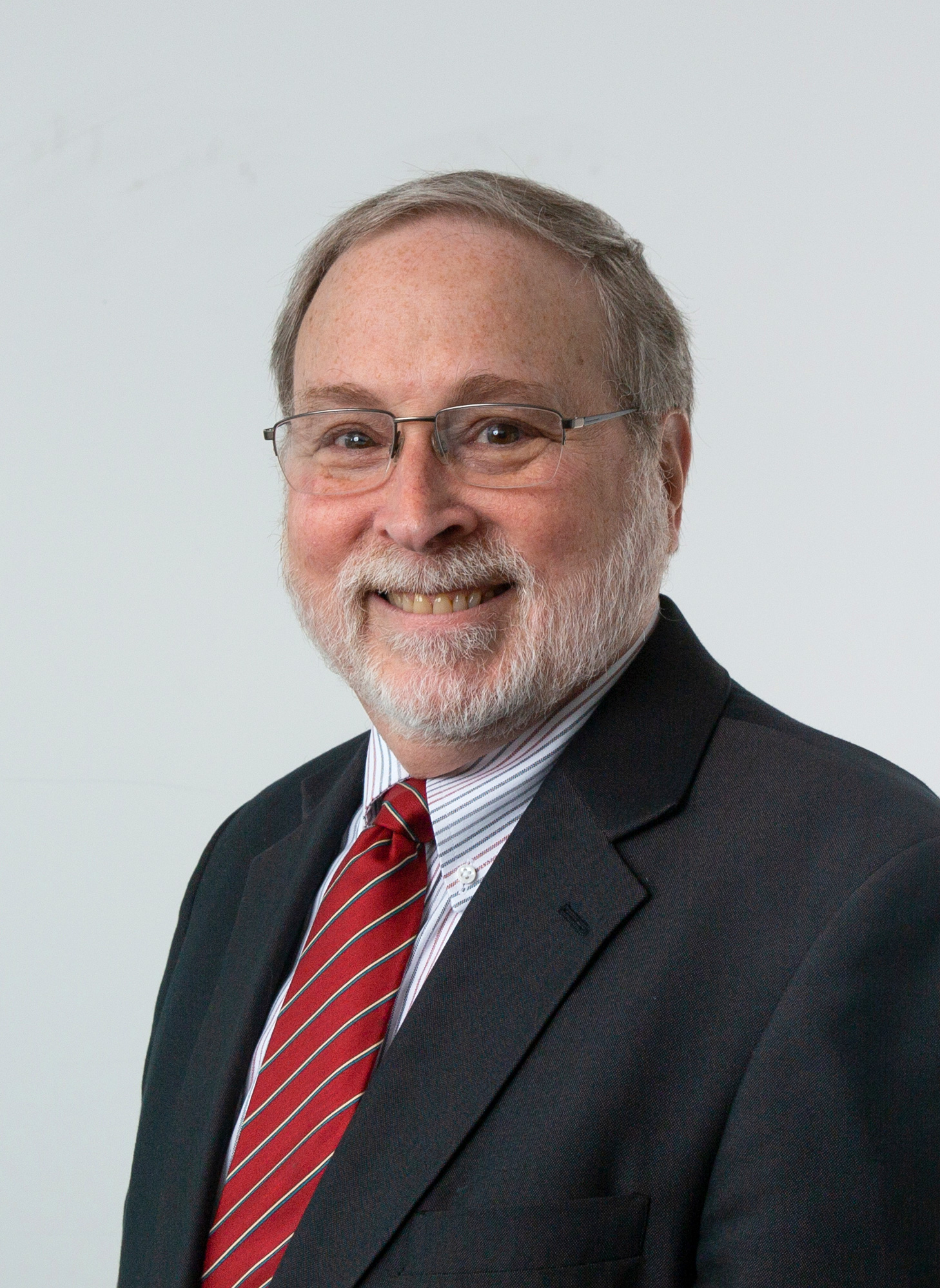
Regardless, according to Goldford, “one point of view is that the community here is too small to let divisions and differences of opinion override the common concerns [of] the Jewish community.”
As a Republican, Hockenberg said his “policy has always been that one friend can [have a] different policy, but that should never affect personal relationships.”
Meanwhile, the topic of Israel seems to be secondary compared to the kitchen-table issues.
Goldford cited the small Jewish population in the state in that they “don’t feel embattled,” though there is concern about the anti-Israel BDS movement.
Adelman said that it’s not just Israel, but foreign policy overall that hasn’t been front and center because “there’s such a weight upon the domestic agenda that people are focused on,” such as health care, “which affects their pocketbook the most.”
Nonetheless, he said, “as the process goes on, the Jewish community will identify candidates that speak to them on issues relating to the Middle East.”
On the Republican side, said Rogers, “Israel tends to be a very important issue—our strategic relationship with Israel and making sure that we have good, sound foreign policy regarding Israel and the Middle East. Defense is important there as well.”
He added that the Jewish Democrats in the state overall support the Jewish state, though some are “a little more critical of Israel … maybe even critical of the current [Benjamin] Netanyahu administration, and that they’re looking to potentially find a different policy, a path to move forward.”
Hockenberg, who has been involved in Iowa politics since 1980, said that the minor focus on Israel on the Jewish Democratic side in Iowa is “very clearly a reflection of the American political scene.”
“The Democratic Jewish community in America is opposed to Bibi Netanyahu as the prime minister because he’s more center-right rather than left. And that goes back to the Obama relationship with Bibi, which was more of a hands-off,” he continued. “And I think that has overlapped into the American Democratic Jewish community attitude towards Israel, and that reduces their support for Israel. They are concerned about certain issues in Israel, which are domestic, but they feel they’re entitled to have some comment and influence.”
Along with AIPAC, pro-Israel organizations such as Christians United for Israel and Iowans Supporting Israel operate in the Hawkeye State.
Which candidates the Jewish community has been supporting remains to be seen.
Adelman noted that “multiple candidates or their staffs have reached out wanting to speak about the U.S.-Israel relationship. Many of these candidates are careful not to be baited by the far-left anti-Israel activists, knowing that the majority of the democratic voters are still overly supportive of a strong U.S.-Israel relationship.”
Anti-Semitism “does not occur that often” in Iowa, according to Goldford. Rogers said that he doesn’t experience daily anti-Semitic incidents, though he knows people who have encountered such situations.
“But for the most part, I think it’s that people don’t encounter very often so that may not seem as of an important issue to be discussing,” said Rogers. “It’s what you see and do every day and experience every day that becomes the most important things to you.”
‘We’re a purple congregation’
In Des Moines are three congregations: Tifereth Israel (Conservative), Temple B’nai Jeshurun (Reform) and Lubavitch of Iowa (Orthodox rabbi). In 2016, the Orthodox synagogue, Beth El Jacob, closed and is now partnered with Chabad.
Temple B’nai Jeshurun, founded in 1873 as Des Moines’s first Jewish congregation, is Iowa’s largest and is led by Rabbi David Kaufman, who has been in Des Moines for 16 years, towing a moderate line politically in a time of immense polarization.
“We’re one of the most politically active congregations as far as membership goes,” said the rabbi of the 300-member-unit synagogue, some of whom belong to the other congregations in the area, including Chabad.
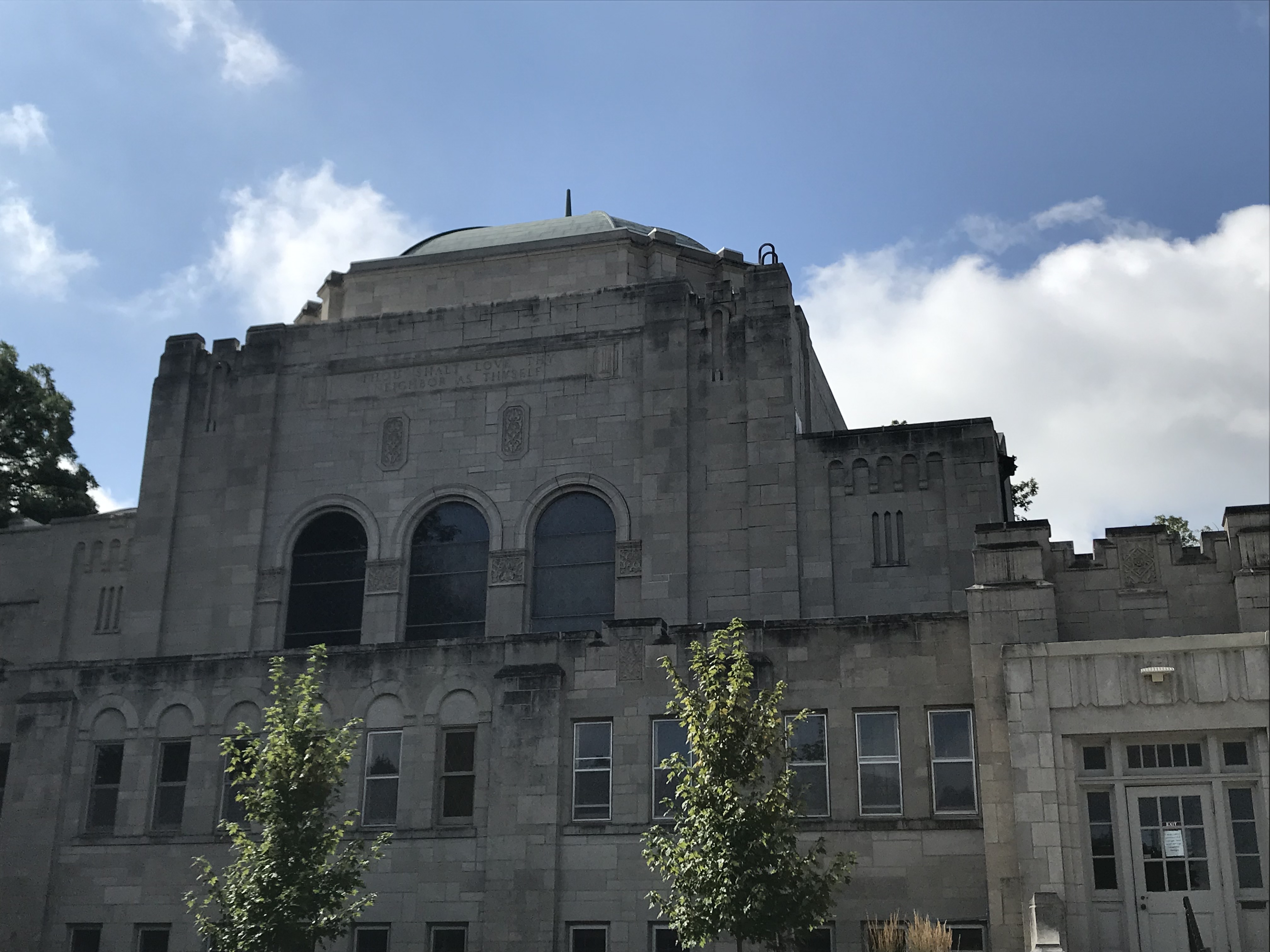
“Our members are involved in a lot of different things. That generally means that on a lot of things we have to maintain neutrality, especially when we’re dealing with internal party politics like primaries, so we tend to advocate for issues and take more moderate lines on issues,” he continued. “When we do, we try to seek something that’s going to be supported by both Republicans and Democrats that might actually get passed somewhere.”
However, Kaufman noted that he knows “a lot of members who are much further on the progressive side or are much further on the right than the congregation is,” adding that most members are on the left, though not as further on that end on the spectrum compared to Reform congregations on the East and West coasts.
He cited the significant number of intermarried couples in his congregation being a factor for B’nai Jeshurun’s moderation politically and ideologically.
“If you have a congregation in which there’s very little interfaith marriage, you’re going to have a very progressive congregation,” he said. “But the second people start marrying in large numbers with people in the overall population, you’re going to bring in people who are less progressive because virtually everyone else is less progressive.”
Kaufman said that his members are involved in political causes such as abortion rights, where some associate with Planned Parenthood and National Abortion Rights Action League, better known as NARAL. There are also members who are involved in groups related to the environment, guns, immigration and health care.
“I do a lot of Israel advocacy; people leave that largely to me,” he said. “But we have a few others in the congregation who do that as well.”
Kaufman noted that leading up to the caucus, his congregation “tends to get very divided, and we have a lot of conversations going on, mostly online. It’s not like they happen at services or they happen in different places.”
The rabbi cited that he’s connected on Facebook with most of his members, so he sees the intensity surrounding political discussions on the platform, “mostly between the Democratic Socialists and the rest of the Democrats.” The Republican members don’t engage because “the argument on the Democratic side oftentimes is pretty heated and nasty, and they just want to stay out of it.”
One example was the rivalry in 2016 between supporters of former U.S. Secretary of State Hillary Clinton and Sen. Bernie Sanders (I-Vt.)
This year’s rivalry among Democrats, according to Kaufman, is between Democrats who want to pick the candidate that can best beat the president and those who want a candidate that advocates for particular issues, like single-payer health care.
“We’re a purple congregation,” he said, referring to the color in American political lingo that is for states that are moderate or go back and forth between parties in elections.
“I’m a well-known moderate, so I get attacked oftentimes from both sides,” said Kaufman, a self-described independent who added that he does sermons on political matters (not advocating for candidates), and that he has worked with and attends events hosted by both Republicans and Democrats.
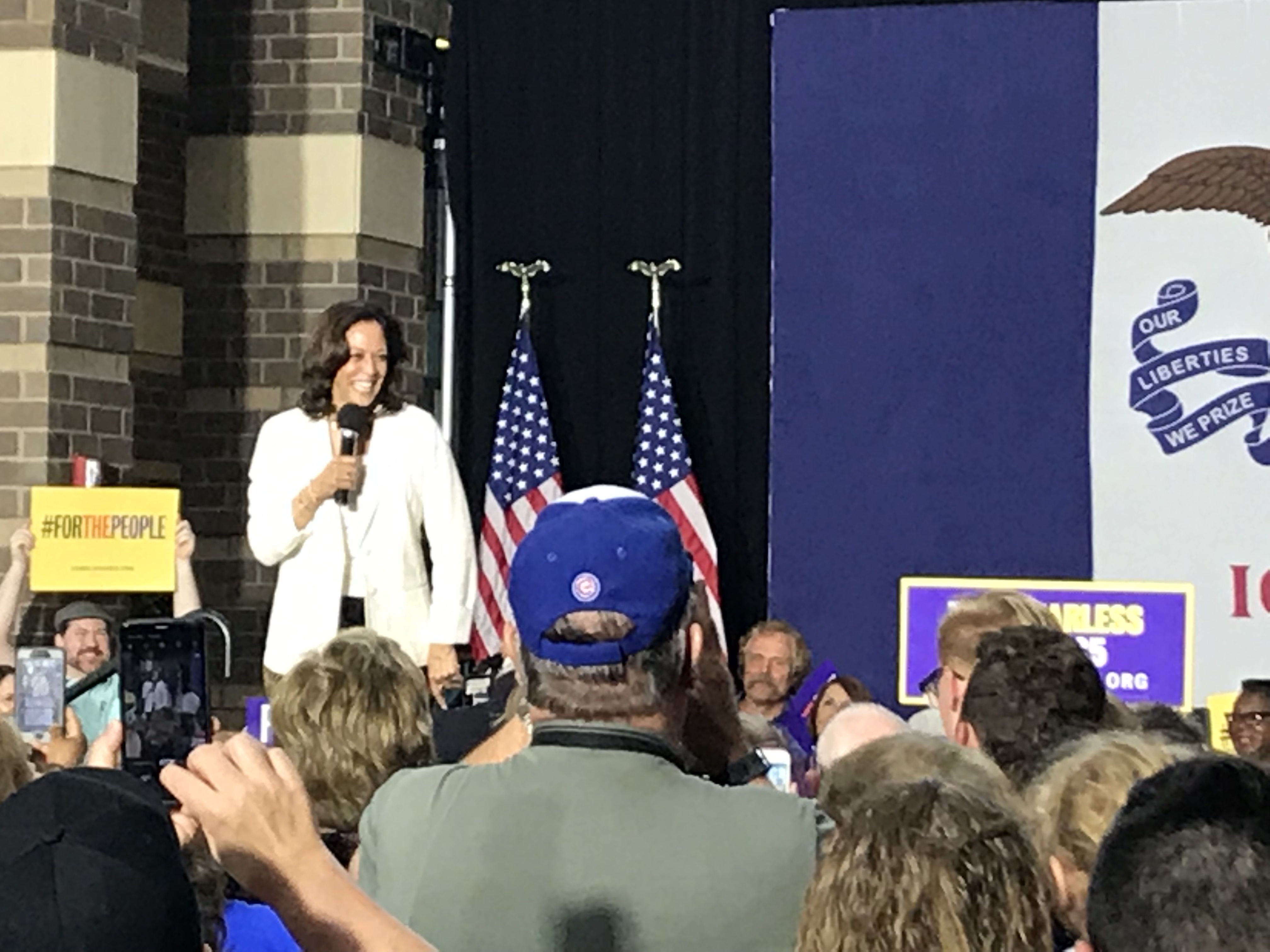
Sermons include subjects such as mindfulness and sinat chinam(Hebrew for “baseless hatred”), of which there is no shortage in today’s political discourse with attacking not only policies, but the people behind and advocating for them.
Kaufman was the only Reform rabbi to attend the first of two White House Hanukkah parties in December 2017.
Nonetheless, the rabbi, who teaches a huge monthly class on current events and foreign policy at Drake University in Des Moines, acknowledged that as a moderate “sometimes it’s more difficult to engage” in a political discussion.
He remarked that “It’s been much easier to engage in that discussion in year’s past than it is now in our highly partisan, political environment,” and that “anything that smacks of trying to promote understanding of Republican politicians results in attacks from the left oftentimes and the reverse is true.”
“When I try to point out that maybe there’s some validity to positions that are coming from the political left, I end up getting the same kind of feedback from other people,” noted Kaufman. “I try to present information and let people make their own decisions as much as possible, and I try to promote the basic Jewish ideals for things as far as what our texts actually say.”
In terms of the reception he gets from his congregation, Kaufman said, “I probably open people’s eyes to possibilities that they didn’t really see. They’re willing to listen to me because they know that I am not super highly partisan,” while at the same time receiving pushback from those who are “super highly partisan.”
He added that most of his congregants “are happy that we don’t take a political line.”
‘There are people who want to take their buttons off and be a Jew’
During caucus season, a lot of young people, including campaign workers, contribute to what Kaufman labeled “a charged energy.”
“You either have people who are really interested in coming to services because they believe that their Judaism connects to their politics and then they kind of bring their politics with them,” he said. “And then you have people who come to services because they want to get away from politics for an hour or a couple hours. There are people who want to take their buttons off and be a Jew at services.”
Kaufman mentioned his congregants are involved in the caucus process—from listening to candidates at the soapbox at the Iowa State Fair and around the state.
When both Republicans and Democrats have multiple candidates running, like in 2016, some of the rabbi’s congregants, regardless of their partisan affiliation, will even listen to candidates from both sides of the aisle.
“People in Iowa generally, if you’re involved, you tend to act like you’re at the caucuses all the time. Which means that you are analyzing all the candidates. You are trying to understand all of their positions,” he said. “You’re trying to rank your candidates. … You have an order of candidates you’ll support.”
Kaufman mentioned Friday night dinners at his synagogue, where he goes from table to table and is wowed by “the depth of knowledge that a lot of people will have.”
“They’ll quote policies to you from their campaign pages,” he said. “People take it seriously here.”
The rabbi stated that the dinners will resume next month.
“People like interacting with the different political groups,” said Kaufman, adding that there’s an invitation for the candidates to speak at the synagogue with some events being held at Tifereth Israel or the Jewish Federation.
Nonetheless, the rabbi said that B’nai Jeshurun provides a Shabbat environment that allows people who want to get away from the political madness, with such discussions happening at the tables at the dinners, some of them intensely political.
Kaufman said that it’s not uncommon for some to get up from one table and go to another.
“There are people who will complain about it and say, ‘I just wanted to get away and I can’t.’ And other people will say, ‘Yeah, but that’s what’s going on right now.’ ”
‘I just let the pastrami talk for itself’
Lubavitch of Iowa Rabbi Yossi Jacobson runs a Chabad center and Maccabee’s Kosher Deli, serving a slice (or more) of kosher heaven along with lifelong wisdom, especially leading up to the Iowa Caucus, which will be held Feb. 3, 2020.
Sitting down with JNS at his deli, which was renovated over a three-year period, Jacobson, who has lived in Des Moines for 28 years with his wife and now seven kids, said that “because there is so much noise today, people are beginning to hear the calling of Torah—the calling that God is calling everyone here for a mission to fulfill.”
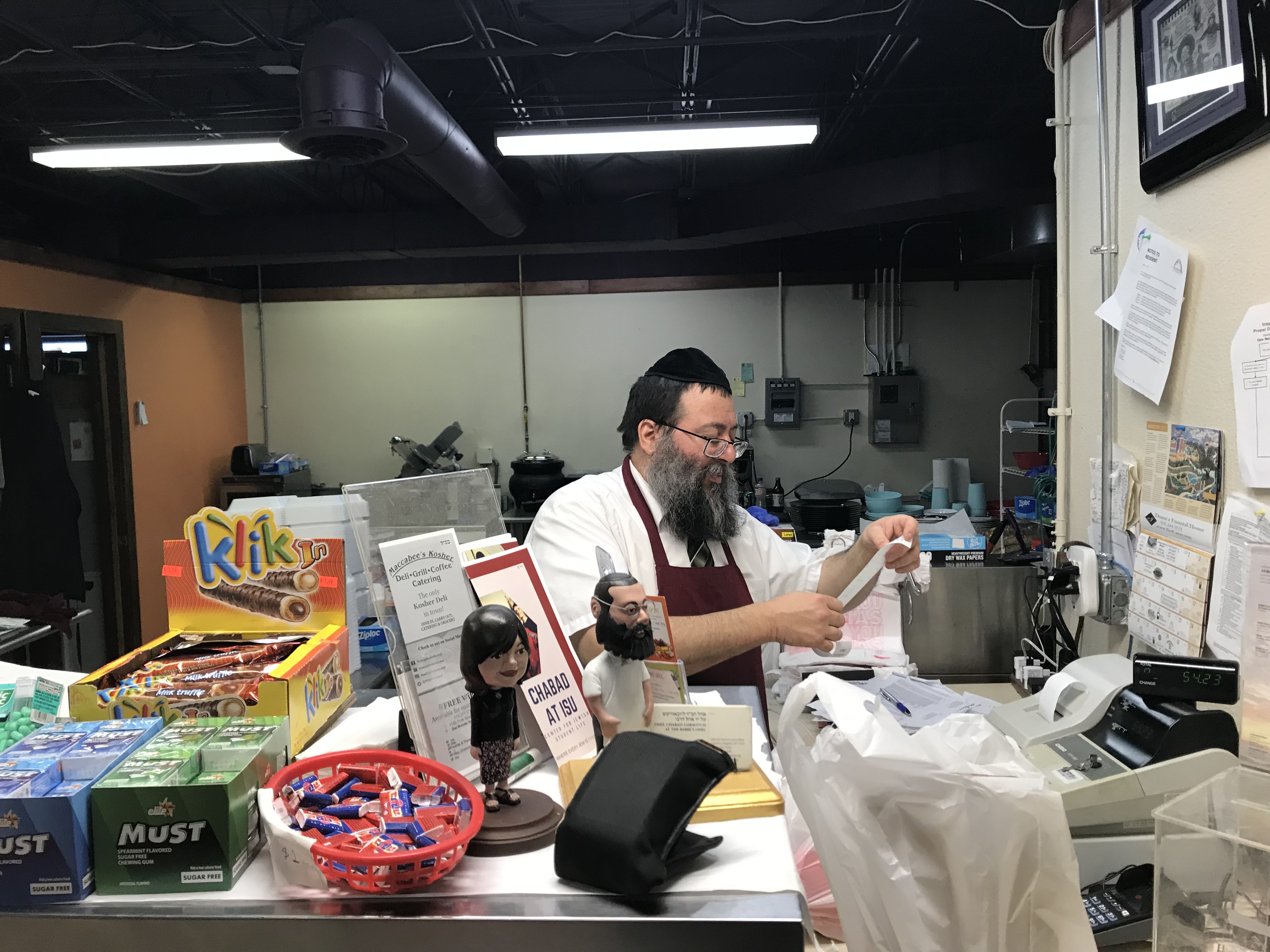
“You’re standing in a deli and you’re talking to people. You’re learning from people and you’re giving people perspectives,” he said. “You’re giving a perspective of who we are as a people.”
Jacobson mentioned his reverence for Kaufman, who, along with Finkelstein, once wrote a letter to the Arab-Muslim community. Jacobson didn’t see the letter, but a few months afterwards, a delegation from that community went to the deli to have a weekday lunch.
The delegation told Kaufman about the letter. He later expressed appreciation to Kaufman and Finkelstein, “even though we know where they stand with Israel … I just let the pastrami talk for itself.”
Jacobson said that kitchen-table issues like health care dominate the political discussion in Iowa leading up to the caucus, but at the end of the day, “we just have to keep on succeeding in what G-d almighty lets us succeed with our families, our jobs, have more people come to the deli. I don’t have any hope other than Hashem. I have G-d-care. Please give me another day I don’t have to be in any level of sickness. So far, so good.”
Campaign volunteers not only go to the deli, but to the Jacobsons for Shabbat meals. Even a few Palestinian volunteers from Sen. Elizabeth Warren’s (D-Mass.) campaign had lunch at the deli three weeks ago.
Jacobson noted that always on the menu are hamantaschen, the signature treat on the Jewish holiday of Purim; latkes, traditionally served on Hanukkah; and pickles, which brings people “back home.”
“People love coming here. They feel a sense of clarity where there’s so much noise and clutter; they come to hear the calling,” said the rabbi. “They come to hear how Jewish people stand on all these issues.”
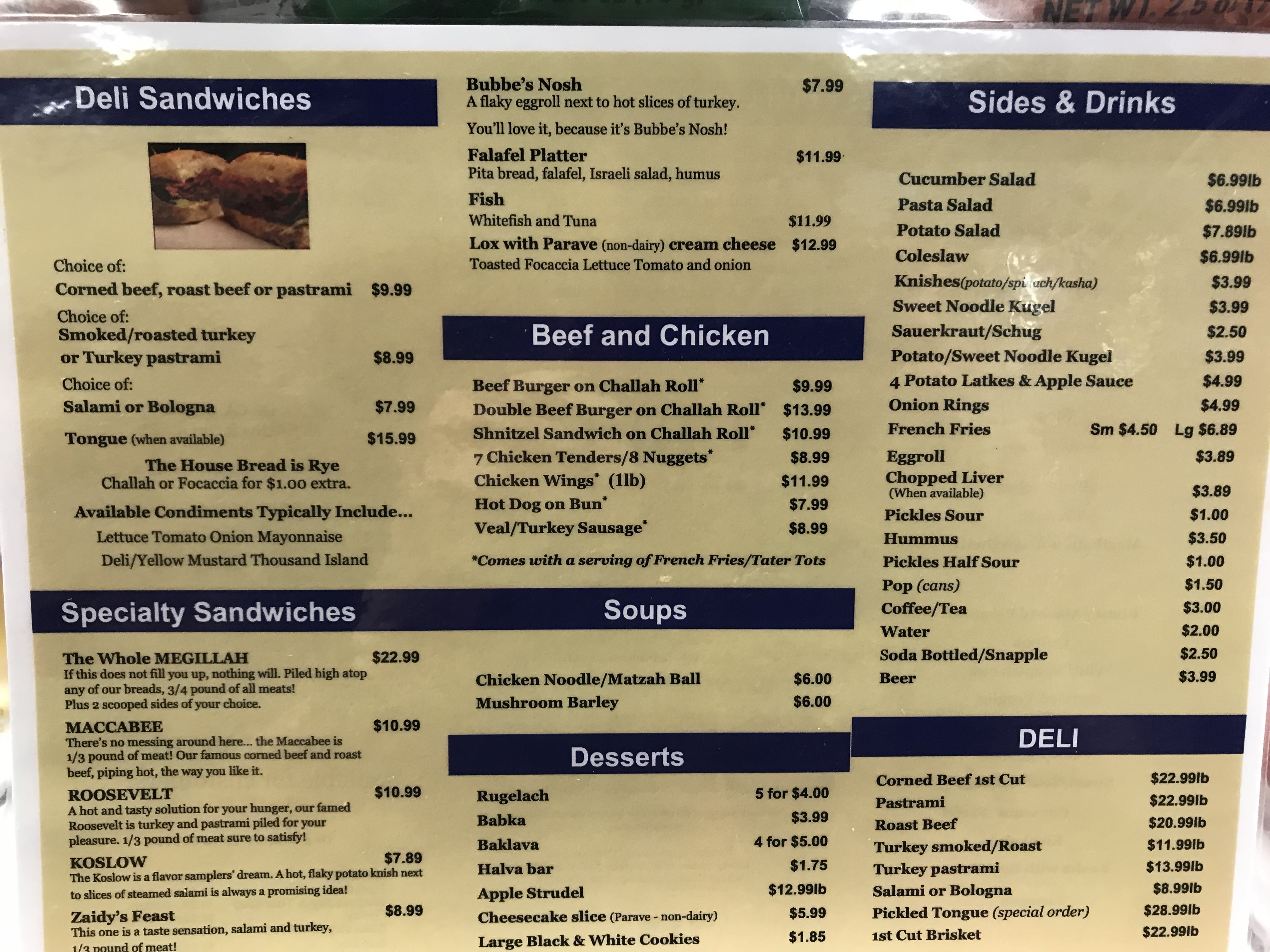
The deli went from contents in freezers at the Jacobsons’ home to a store, thanks to the help of the community and former Gov. Terry Branstad, whose mother was Jewish.
On the day of the interview with JNS, a man reminded Jacobson that six years ago, he helped him get through a divorce. Jacobson didn’t remember him, but made it a point to say that “he came back. Just had a sandwich to support the deli.”
Jacobson has helped people across the board, whether it’s girls who were abused by their fathers or a former successful businessman who has been jobless for two years. The rabbi has made some calls to help get the man hired, reassuring that someone out there will employ him.
“These callings come, you act on it,” said Jacobson. “It’s more than just spreading Judaism. It’s spreading humanity, spreading morality, encouraging people to be responsible to the gift of life G-d wants them to have—not to throw it away. So the deli has become a lot more than just pastrami and corn beef and matzah-ball soup. This is the excuse why they come here.”
Among traditional Jewish offerings, “The Maccabee” is the most popular item on the menu, said Jacobson. The specialty sandwich is one-third a pound of corned beef and roast beef.
Jacobson remarked that he’s open to the 2020 presidential candidates visiting the deli.
The rabbi mentioned LGBTQ people who told him that if his deli displayed the rainbow flag, it would be welcoming to their community.
Jacobson recalled telling them, “I don’t welcome Jews. I don’t welcome blacks. I don’t welcome LGBT. I welcome everyone as a human being.”
Outside Des Moines
Outside Iowa’s state capital is a Chabad in Iowa City, Bettendorf, Ames and Postville.
The Postville one is run by Rabbi Aron Schimmel, married with 10 kids. He told JNS that the Jewish community there is about 50 families, most of whom are Orthodox. The Iowa Caucus is casually discussed, unlike in Des Moines.
“In our place, [we] don’t talk about it so much,” he said.
However, Postville is no exception to the political sphere, as it was the place where Sholom Rubashkin infamously ran a now-bankrupt kosher slaughterhouse and meat-packing plant, Agriprocessors, employing undocumented immigrants. He was criminally charged with fraud and sentenced in June 2010 to 27 years in prison. (The kosher plant was bought in a July 2009 auction and is now called Agri Star.)
In December 2017, U.S. President Donald Trump commuted Rubashkin’s sentence, which Schimmel called “a big miracle.”
Today, said Schimmel, there’s “a new era,” as the years have passed since that episode.
About three hours away from Postville, Rabbi Linda Bertenthal leads Temple Emanuel, a Reform synagogue in Davenport with around 105 families, and is currently undergoing renovations on the inside.
Bertenthal, a registered Democrat, said most of her congregation, like most Reform ones, are progressive and care about issues such as immigration and the environment, where there is a “wide range of opinions.”
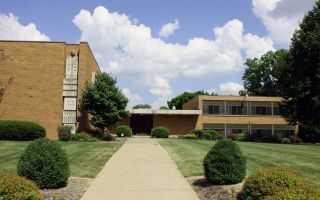
In her sermons, she said she doesn’t utter the word “president” or “Trump.”
“I consider every issue that I see an ethical dimension to, which is basically everything as fair game for sermonizing,” she said. “I talk about issues, never people or political roles or political parties, G-d forbid.”
Bertenthal noted that when attending candidate events “you always see a lot of fellow Jews there.”
Alarmingly, her community feels that anti-Semitism is on the rise. “It feels like a dangerous time to be Jewish, and everyone is incredibly security-conscious all the time wherever they go,” she said. There are one or two off-duty officers protecting the synagogue during services.
Bertenthal said the neighborhood around Temple Emanuel’s sister synagogue, Congregation Beth Israel at the Tri City Jewish Center in Rock Island, Ill., has been “leafleted” with white-supremacist and anti-Semitic “literature.”
“We feel it over here,” she said, “plenty.”
However, Bertenthal added that there’s more love than hate in the community, including from non-Jews, who expressed support in the aftermath of the October 2017 shooting at the Tree of Life*Or L’Simcha Synagogue in Pittsburgh.
The rabbi has interacted with Sens. Kamala Harris (D-Calif.) and Warren, and has accepted meetings with representatives of other candidates, including Sen. Kirsten Gillibrand (D-N.Y.) and Pete Buttigieg, the mayor of South Bend, Ind.
She and her husband sought to “convey how important it was to us for candidates for the presidency to really understand the issues in Israel and to understand them in a full historical perspective, and not to view it in some of the simplistic ways that many people view it. And how impossible it would be for us to support a candidate that didn’t support Israel’s right to exist.”


